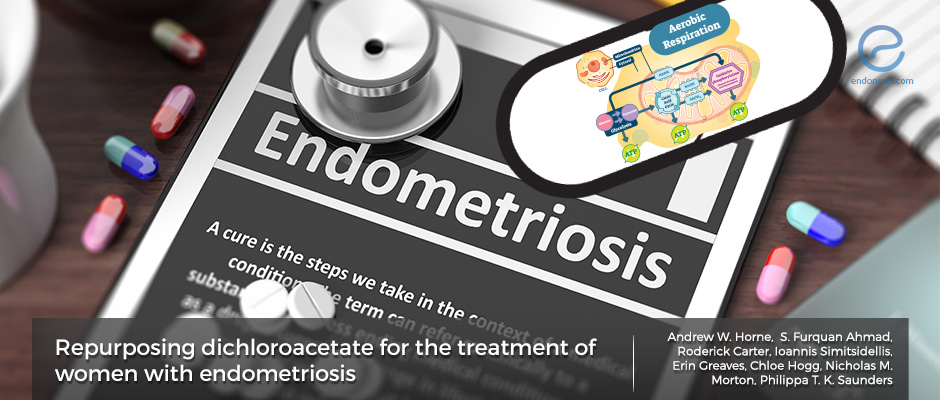A nonhormonal treatment of endometriosis: Dichloroacetate
Jan 20, 2020
Oral administration of dichloroacetate reduced the size of endometriosis lesions in a mouse model.
Key Points
Highlights:
- Aberrantly increased glycolysis of human peritoneal mesothelial cells can be reversed with dichloroacetate.
Importance:
- Dichloroacetate may be an alternative to drugs for the treatment of endometriosis to date which has been contraceptive, limiting their use in women of child-bearing age.
What’s done here?
- Researchers investigated the impact of dichloroacetate, pyruvate dehydrogenase kinase inhibitor, in human cell culture and a mouse model of endometriosis.
Key Points:
- Peritoneal mesothelial cells show higher glycolysis, lower mitochondrial respiration, decreased enzymatic activity of pyruvate dehydrogenase and increased production of lactate in women with endometriosis.
- Transforming growth factorβ1 and lactate are elevated in the peritoneal fluid of endometriosis patients.
- Increased lactate concentrations in the pelvic peritoneal fluid may facilitate the invasion of ectopic endometrial cells.
- Dichloroacetate may also have an effect on other cell types altered in endometriosis patients, including macrophages and endometrial stromal cells.
Lay Summary
In women with endometriosis, peritoneal mesothelial cells show higher glycolysis, lower mitochondrial respiration, decreased enzymatic activity of pyruvate dehydrogenase and increased production of lactate compared to women without the disease. Transforming growth factorβ1 and lactate are elevated in the peritoneal fluid of endometriosis patients.
Lactate can stimulate cell migration and invasion, and immune escape during tumorigenesis, with the same processes implicated in the etiology of endometriosis. Increased lactate concentrations in the pelvic peritoneal fluid may facilitate the invasion of ectopic endometrial cells into the peritoneum so that they form lesions. All these findings are according to a new study published in the journal Proceedings of the National Academy of Sciences.
In this study, Horne A.W. et al., researchers from the United Kingdom, showed that the abnormal cellular energy state in endometriosis patients can be corrected by treatment with dichloroacetate which is a pyruvate dehydrogenase kinase inhibitor, used to treat cancer. Dichloroacetate reduced human peritoneal mesothelial cell lactate release in vitro, and oral dosing of mice reduced endometriosis lesion size in vivo. Pyruvate dehydrogenase kinase 1 appears to have the highest sensitivity to inhibition by dichloroacetate among four different isoforms of pyruvate dehydrogenase kinase.
The authors stated that dichloroacetate could also have an effect on other cell types altered in endometriosis patients, including macrophages and endometrial stromal cells.
Current medical treatments of endometriosis are contraceptive, often with unpleasant side effects. According to this exploratory-phase clinical trial, dichloroacetate may be used as a nonhormonal treatment for endometriosis patients, if effectiveness and acceptability are demonstrated.
Research Source: https://www.pnas.org/content/early/2019/11/26/1916144116
endometriosis repurposing dichloroacetate glycolysis lactate pyruvate dehydrogenase

